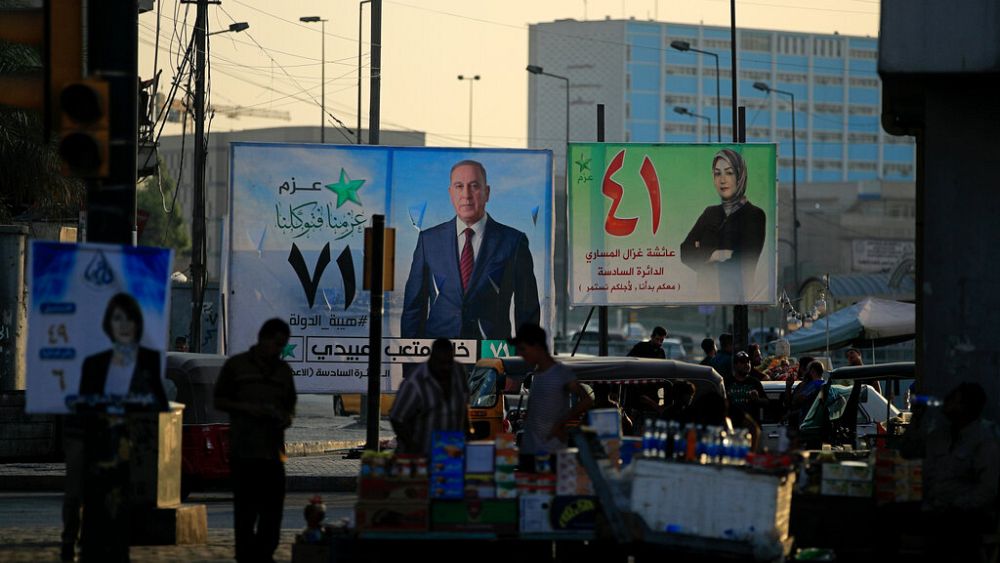
On Sunday, October 10, Iraqis will head to the polls for snap parliamentary elections: the first vote in the country since massive protests hit Iraq two years ago and toppled the last government. They’re also the first to be held under a new electoral law demanded by the protesters. Both the European Union and the United Nations have sent monitors to Iraq in what will be one of the UN’s largest ever electoral assistance projects worldwide. Iraqis, however, are less interested in the vote itself than in what comes after.
Many Iraqis no longer believe elections can bring about change. Rather, they believe political elites will continue to divide up roles and resources through backroom deals. The 2019 protestors demanded the overhaul of the entire political system; elections are just one small piece of the puzzle.
Nevertheless, encouraging voters to turn out on October 10 is crucial. Low turnout will only benefit the established political parties that have monopolised power since 2003. And if they retain their grip because large sections of the population don’t vote, some expect it will limit their credibility and legitimacy. Thus, pessimism about the elections could be self-fulfilling.
What’s changed since the 2019 protests?
Although the new electoral law doesn’t meet all the demonstrators’ demands, breaking down the formerly 18 electoral districts into 83 does mean that voters will have a clear representative to hold to account. And even though many are threatening to boycott the elections, others are joining the ballot. This new breed of political actor could, with enough votes, carve out a space for formal political participation. It wouldn’t transform Iraqi politics overnight, but it would be a step in the right direction.
If many Iraqis are feeling lukewarm about the election itself, they will be watching closely what happens next. The 2019 protests were a strong sign that the population has lost patience with governments that don’t deliver. Even if the vote brings back many of the same old faces, they will need to hit the ground running, and embrace reform and the people’s will. If they do not, it will further erode Iraqis’ faith in the democratic process.
A new government will need to be formed quickly, without the months-long delays that have been seen before. After the protests led to the resignation of Prime Minister Adel Abdul Mahdi in November 2019, Iraq was left without a functioning government for six months until Mustafa Al-Kadhimi was finally confirmed as the new premier. For the next 18 months organizing the elections left the Al-Kadhimi government with little bandwidth for concrete action.
The new government cannot devote so much time to political wrangling. It must also reflect the election results, not back-room deals, and most importantly base its activities on a shared agenda to address the core challenges Iraq is facing. The population will want to quickly see evidence that the new government is addressing its needs. Without this, Iraqis will go back to the streets and squares, and could topple the government yet again.
More at stake than ever before
Iraq is facing many critical challenges. The twin shocks of the COVID-19 pandemic and plummeting oil prices wreaked further havoc on a country already facing dire economic strain. Oil exports account for almost 95 per cent of government revenues, leaving the economy fragile and susceptible to market fluctuations. Successive governments have pledged to wean Iraq’s economy off oil, but made little progress. Dwindling oil revenues since 2020 forced the government to introduce austerity measures and devalue its currency by a fifth, driving up the cost of living.
Basic services remain inadequate. Poor healthcare and a lack of water and electricity are among Iraqis’ core grievances. Two tragic hospital fires earlier this year and a near-total power outage in the midst of a scorching heatwave exposed the country’s weak and neglected infrastructure, and the insidious effects of corruption. On top of these are the significant effects of climate change in a country already prone to desertification and water scarcity.
Lack of action to remedy these problems has reinforced a widely-held view that the ruling elite is indifferent to the suffering of ordinary Iraqis. The new government has to do better. Numerous plans have been developed to address the multiplicity of issues Iraq faces, but partisan squabbling has prevented successive governments from implementing them. All the political blocs need to back reform and the successful implementation of long-term strategies if the new government is to make inroads.
In his recent visit, the EU’s High Representative for Foreign Affairs and Security Policy, Josep Borrell, emphasised the importance the EU places on Iraq’s future. Once the elections are over, the European Union should step up its engagement in supporting the reform process that follows. It is not the elections that will stabilise, but what happens next.
—
Shivan Fazil is a researcher for the Middle East and North Africa Programme at the Stockholm International Peace Research Institute (SIPRI). Dylan O’Driscoll is director of the Middle East and North Africa Programme.
THE ROTTEN FISH: CAN OF WORMS OPENED OF APC & TINUBU'S GOVERNMENT OVER NIGERIA'S ECONOMIC DOWNTURN
WATCH THE CRITICAL ANALYSIS AND KNOW THE RESPONSIBLE PARTIES TO BLAME FOR NIGERIA'S ECONOMIC CHALLENGES, WHILE CITIZENS ENDURE SEVERE HARDSHIPS.Watch this episode of ISSUES IN THE NEWS on 9News Nigeria featuring Peter Obi's Special Adviser, Dr Katch Ononuju, 9News Nigeria Publisher, Obinna Ejianya and Tinubu Support Group Leader, McHezekiah Eherechi
The economic crisis and hardship in Nigeria are parts of the discussion.
Watch, leave your comments, and share to create more awareness on this issue.
#9NewsNigeria #Nigeria #issuesInTheNews #politics #tinubu THE ROTTEN FISH: CAN OF WORMS OPENED ...
DON'T FORGET TO SUBSCRIBE AND LEAVE YOUR COMMENTS FOR SUBSEQUENT UPDATES
#9newsnigeria #economia #economy #nigeria #government @9newsng
www.9newsng.com
